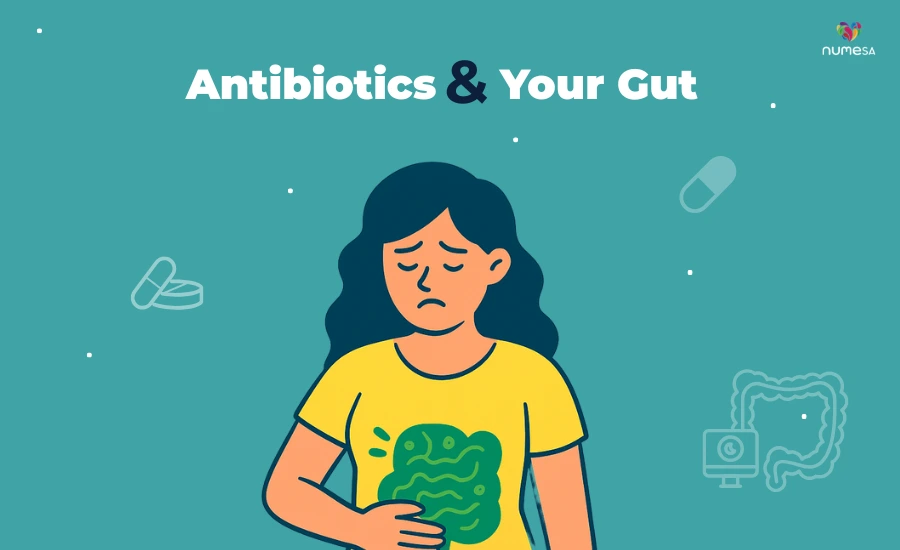
Gut health after antibiotics is something most people don’t think about — until symptoms show up. While antibiotics are life-saving, they don’t discriminate. They kill harmful bacteria, but also disrupt the good microbes that support your digestion, mood, and immune system.
As a result, you might experience bloating, low energy, mood changes, or frequent infections. The good news? You can restore your gut naturally. At NuMeSA, we believe healing begins from the inside out.
Let’s walk through how antibiotics affect your gut — and what you can do about it.
What Happens to Your Gut After Antibiotics?
Your gut is home to trillions of bacteria. These microbes help you digest food, fight illness, and even stay focused. But antibiotics — especially broad-spectrum types — can do real damage.
They can:
- Reduce the variety of bacteria in your gut
- Wipe out helpful strains that take weeks or months to recover
- Give harmful bacteria or yeast a chance to grow (like Candida)
- Lead to bloating, brain fog, irregular digestion, and fatigue
That’s why it’s so important to focus on gut health after antibiotics.
A 2024 study in Antibiotics and the gut microbiome found that antibiotic exposure can significantly alter the composition and function of the gut microbiota — with long-term consequences for immunity, digestion, and health.
How to Rebuild Gut Health After Antibiotics
Now that you know the impact, here’s how to help your gut recover — using simple, natural habits.
1. Go Whole, Go Simple
- Choose unprocessed, whole foods
- Avoid too much sugar or alcohol
- Eat more fibre-rich veggies like spinach, carrots, sweet potato, and bananas
Fibre is key — it feeds the good bacteria you want to grow back.
For an added boost, our NuMeSA Gut Powders contain three types of fibre — plus the bonus of probiotics — to help nourish your microbiome from all angles.
2. Add Good Bacteria Back In
Next, bring in the good bugs. You can find probiotics in:
- Milk kefir or water kefir
- Sauerkraut, kimchi, or miso
- Yogurt with “live and active cultures” on the label
A spoonful a day can help reintroduce good bacteria and restore gut health after antibiotics.
3. Hydrate to Help Your Body Flush Out Waste
- Drink at least 6–8 glasses of clean water per day
- Try herbal teas like ginger, peppermint, or rooibos
Hydration keeps your digestive system moving and supports detox.
4. Calm the Gut–Brain Axis
- Get enough sleep
- Practice deep breathing or mindfulness
- Limit screen time and stressors in the evening
According to Harvard Medical School, the gut and brain are directly connected. When one is off, the other follows.
Healing Takes Time — But It Works
Balancing your gut again takes time. Still, it’s worth it. With consistent habits, you may notice:
- Less bloating
- Stronger immunity
- Fewer cravings
- A clearer mind and better focus
Your gut is resilient. It can bounce back — if you give it the right tools.
Final Word
Antibiotics serve an important purpose. However, they often leave your gut depleted. Fortunately, with the right foods, more hydration, stress care, and fermented support, you can restore your gut health after antibiotics.
At NuMeSA, we believe your health starts in your gut — and healing starts today.
Hi there!
Subscribe to our Newsletter to keep up to date with all things gut health!